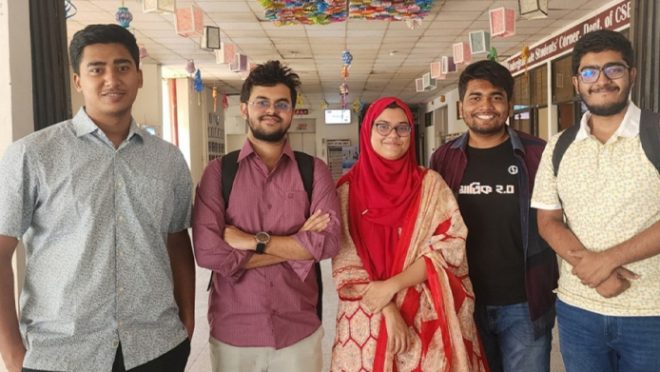NeoScreenix: How BUET students’ early breast cancer detection technology can make a revolution
NeoScreenix: How BUET students’ early breast cancer detection technology can make a revolution

One of Fahmida Sultana’s close relatives is a breast cancer survivor— the only one to survive among all the patients treated by the doctor she consulted. Also, as a woman herself, Fahmida felt a call to work on addressing the issue of breast cancer.
Breast cancer is the most common cancer in women and a leading cause of death in Bangladesh. More than 13,000 women are infected, and over 7,000 die every year, according to data from the International Agency for Research on Cancer (IARC), a part of the World Health Organisation.
A woman should perform a monthly breast self-test during her menstrual cycle, but this practice remains uncommon in developing countries like Bangladesh.
“On top of that, these self-testing tools are not available in Bangladesh, and the available ones are very expensive. So, our goal was to develop something simple, handy and affordable,” Fahmida said.
Fahmida is a final-year computer science engineering student at the Bangladesh University of Engineering and Technology (BUET). She teamed up with her four other classmates— HM Shadman Tabib, Sadatul Islam Sadi, Md Hasnain Adil, and Prithu Anan to launch NeoScreenix, an early breast cancer detection technology.
Fahmida led as the team leader and project designer of NeoScreenix. Sadi and Tabib contributed as the backend and machine learning developers, respectively. Adil served as the frontend developer, while Prithu handled hardware development.
The team also included two students with a medical background— Zarin Tasnim from Dhaka Medical College and Ribatul Islam from Rangpur Medical College for data collection. The team was guided by Professor Md Sohel Rahman of Buet’s CSE department.
NeoScreenix is pioneering the use of artificial intelligence for breast cancer detection.
However, the journey started as a simple student venture. The team only aimed to take part in local business idea competitions. Although it did not win any of those contests, each attempt provided valuable experiences and opportunities to refine and improve the project. Over time, this persistence led them to remarkable success— today, they shine bright on a global stage.
Team NeoScreenix secured first place in the Digital Health category at the 2025 Johns Hopkins Healthcare Design Competition, surpassing several top globally renowned institutions, including MIT and Harvard.
The prestigious annual competition was organised by Johns Hopkins Centre for Bioengineering Innovation and Design, within the university’s department of Biomedical Engineering. It drew participation from more than 440 teams representing over 200 global universities.
Their proposal centres around a self-screening mobile application and device that enables women to detect potential signs of breast cancer at an early stage.
The technology integrates artificial intelligence, user-friendly UI/UX, and portable imaging devices. Among its many features, the app aims to build a community forum for cancer patients where they can interact with one another.
After being shortlisted as one of six global finalists on 10 March, they presented their final pitch online on 12 April.
The team earned $5,000 in prize money, which they plan to invest in further research and development. The app currently operates based on mammogram analysis. They validate its accuracy using a machine learning model. However, testing the kit on humans is still pending.
“Our app has continuously evolved, but the self-testing kit still has scope for further research and development. We intend to work on this over the next two to three months so that we can launch the complete version of our device,” Tabib noted.
Once the device is ready, the next step will be to test it on cancer patients in the country and integrate the data into the current AI model. In the third phase, they will apply for their patent and finally launch in the market.
However, they mentioned that this funding is quite insufficient. They need a substantial amount of funding for everything, from kit development to marketing. They also seek professional mentorship. After winning the competition, some local companies have already approached to discuss it.
In reality, there is very little awareness about breast cancer at the household level in Bangladesh. Fahmida and her team believe that if they can take the technology to a business scale, it will also help increase awareness.


